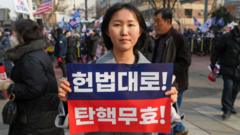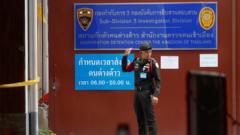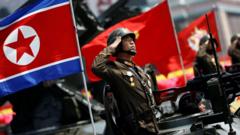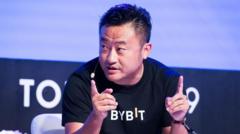**The article examines how conspiracy theories surrounding North Korea and communism have gained traction among supporters of impeached South Korean President Yoon Suk Yeol during an era of political unrest.**
**"Divided Loyalties: The Rise of Conspiratorial Beliefs in South Korean Politics"**

**"Divided Loyalties: The Rise of Conspiratorial Beliefs in South Korean Politics"**
**Analysis of Yoon Suk Yeol's Support Base Amidst Impeachment Turmoil**
As South Korea navigates a politically tumultuous landscape marked by the impeachment of President Yoon Suk Yeol, a wave of conspiracy theories regarding North Korea and the opposition party has taken hold, particularly among his supporters. On a frigid afternoon in January, young pharmacy student Shin Jeong-min stood outside the Constitutional Court voicing discontent, echoing sentiments of many who gathered to rally against what they perceive as the political left's intention to fuse the South with the North, led by Kim Jong Un.
Jeong-min's fears reflect a broader trend found within Yoon's far-right supporters, some of whom are alarmingly young. Unlike the older generations who experienced the devastating realities of prior conflicts, these new adherents have taken to heart claims of infiltration by "North Korean communist forces" within the opposition party, a narrative that has flourished following Yoon's controversial martial law declaration. Amidst chants demanding the emperor's release from impeachment, Yoon's proclamation that radical elements sought to dismantle South Korean democracy has sparked a series of anti-communist rallies, united by a common sentiment of betrayal and loss of freedom.
Despite the historical threats from North Korea that haunted the nation during the Cold War, today many South Koreans view the old fears as exaggerated. Sociologist Shin Jin-wook highlights the irony of how the narrative has resurfaced in contemporary politics, led by a president employing similar anti-communist tactics as previous military dictators. Yoon's rhetoric suggests that dissent within the parliament, led by the Democratic Party, resembles traits akin to Pyongyang sympathizers.
Ironically, as North Korea's overt military threats have waned, they have been replaced by concerns over China's influence, a sentiment echoed in public discourse and rapidly gaining traction as Yoon’s administration continues to exploit societal fears. Anti-Chinese sentiment has become intertwined with these political beliefs, as citizens increasingly suspect external forces meddling in domestic governance.
Polls indicate that a division is looming in public opinion. While Yoon’s alienation grows as a significant percentage still seeks his removal, support appears to be solidifying around narratives of victimization and betrayal propelled by both Yoon's administration and a growing far-right media apparatus. Conspiracy theories that seem unfounded to many have nevertheless assumed a life of their own in this turbulent era of South Korean politics, suggesting a consequential reworking of how new generations perceive their democracy and the historical conflicts defining it.
Young South Koreans are feeling notable resentment towards rising Chinese influence amid rising domestic challenges like housing and job opportunities. Some are pivoting from leftist beliefs previously held, instead viewing martial law and its supporting rhetoric as necessary for preserving democracy. The polarized environment sees the far-right cabal gaining adherents through manipulated narratives where communism and leftist ideas are labeled as existential threats.
As political polarization deepens, these emerging conspiracies and fears continue to shape social dynamics, with experts expressing concern that such sentiments could divide South Korea further. The consequences of Yoon's politically charged maneuvers appear poised to forge an enduring schism within the national consciousness, fueled by fears of encroachment from North Korea and rising apprehensions about China’s overarching ambitions.



















